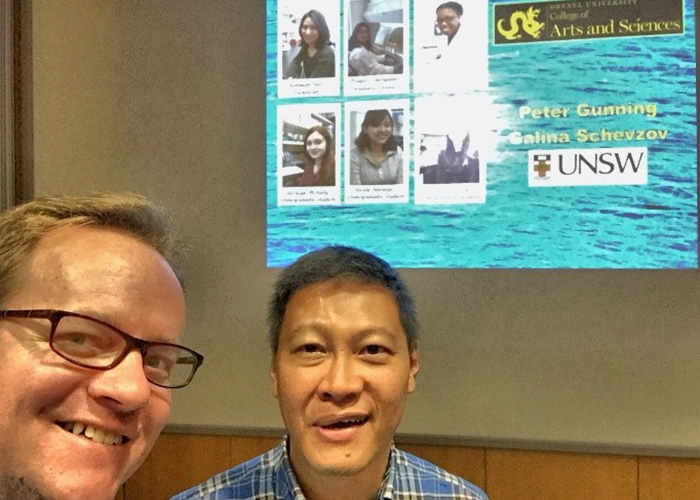International Biology Collaboration Leads to Nature Publication
July 23, 2019
A new paper published in the journal Nature is the result of a successful international collaboration — and it started right on Drexel’s campus in the lab of Assistant Professor of Biology Ryan Petrie, PhD.
In the summer of 2016, Petrie was visited by Joe Chan, PhD, a postdoctoral fellow at the European Molecular Biology Laboratory in Heidelberg, Germany.
“I first met Joe when I hosted him in my lab to teach him how to make intracellular pressure measurements in living cells,” Petrie says.
 Ryan Petrie, PhD, with collaborator Joe Chan, PhD
Ryan Petrie, PhD, with collaborator Joe Chan, PhD
An expert in cell biology, Petrie pioneered the micropressure technique during his postdoctoral research fellowship at the National Institutes of Health to discover how pressure governs the movement of human cells.
Prior to the two researchers meeting, Chan had been investigating the effects of fluid pressure on the size and tissue mechanics of mammalian embryos, which few studies had addressed. After experimenting with several different techniques, Chan — inspired by Petrie’s work — journeyed to Philadelphia to find out if the micropressure technique could be applied to mouse embryos.
In an article describing the project, Chan writes, “I still remember how thrilled we were when we made our first successful measurement … Overall it proved to be an extremely fruitful trip, all thanks to Ryan’s generosity and patience.”
Adds Petrie, “The initial interaction has led to a very fruitful collaboration investigating how hydraulic pressure shapes and controls cell fate in the mammalian embryo.”
When Chan returned to Germany, he continued to use Petrie’s technique to measure the pressure within developing mammalian embryos, with Petrie serving as a technical adviser.
The collaboration continued remotely until last fall, when Petrie visited Chan in Heidelberg with an International Travel Award from Drexel’s Office of International Programs.
“While at the European Molecular Biology Laboratory, I gave a seminar describing my team’s newest published and unpublished work, and got to hear about Joe’s latest discoveries in the lab of Dr. Takashi Hiiragi,” Petrie says.
Just months after this latest in-person meeting, the work Petrie helped Chan start was published as a paper titled “Hydraulic Control of Embryo Size, Tissue Shape and Cell Fate” in Nature, regarded as one of the world’s top peer-reviewed journals in science.
“Joe's work directly shows for the first time that hydraulic pressure shapes the early development of the mammalian embryo — revealing a new, fundamental force during development,” says Petrie, a co-author on the publication. “This work not only opens up new research questions regarding the biomechanical basis of mammalian development, but could have profound implications for understanding how organs, such as kidneys and lung, develop.”
Though the Petrie lab is one of the only groups in the world routinely making these pressure measurements, that may change once Chan establishes his own research program.
“Joe is planning to tackle these areas when he opens his lab, and I look forward to collaborating with him in the future on these exciting new research questions.”
The two scientists also hope to one day establish an international meeting focused on the novel and unexpected functions of pressure in cell and developmental biology.